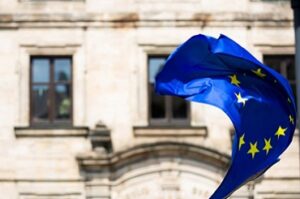 From the 1st of January to the 30th of June 2021, Portugal will hold the rotating presidency of the Council of the European Union (also known as the “Council of Ministers”) – the institution that represents the governments of EU-member countries and brings together ministers and junior ministers to adopt legislation and coordinate policies.
From the 1st of January to the 30th of June 2021, Portugal will hold the rotating presidency of the Council of the European Union (also known as the “Council of Ministers”) – the institution that represents the governments of EU-member countries and brings together ministers and junior ministers to adopt legislation and coordinate policies.
The Presidency is held by each Member State for a period of six months, during which meetings are planned and chaired at the different levels of the Council and the Council is represented in its relations with the other institutions of the European Union.
Since the Treaty of Lisbon (2009), the Presidency is held by Member-State “Trios”, which presupposes close cooperation over an 18-month period – the equivalent to three consecutive Presidencies. Portugal will take over the presidency from Germany (July to December 2020) and the Slovenian presidency will follow (July to December 2021); all three countries are part of the current Trio. They have jointly set up an agenda for this period (available for consultation), according to which the Portuguese Presidency will lay down its priorities.
It is in this context that the Portuguese Platform of Non-Governmental Development Organisations (NGDO) is part of the Presidency Project, Towards an Open, Fair and Sustainable Europe in the World – Second Trio, in partnership with CONCORD – European NGO Confederation – and the National NGDO platforms of Germany and Slovenia, VENRO and SLOGA, respectively.
The Portuguese Platform of NGDOs is in charge of implementing the Project during the Portuguese Presidency. It is currently planning the activities that will take place in the first half of 2021, in particular the events that will mark the beginning of the Project in Portugal in the coming months.
The Presidency Project, which will be formally launched at the end of the year, will seek the engagement of the Portuguese civil society in a concerted manner, aimed at increasing public support to open, fair and sustainable European policies, especially the Agenda 2030, development cooperation, human rights and space for civil society (General Objective of the Project).
In the first stage, organisations will be encouraged to take part in a consultation process at national level to set the priorities of civil society for the Portuguese Presidency. This process will result in a common position paper and will support the development of a joint strategic approach with policy makers.
Applications to a sub-granting mechanism is also foreseen by the end of the year, in the form of grants of up to ten thousand euros for civil society organisations. The goal is to increase young people’s understanding of issues related to European Union policies and the Presidency project and to contribute to the project’s efforts to inform and raise the awareness of the general public.
In the first half of 2021, the Portuguese Platform will organise several capacity-building activities for NGDOs on the country’s priority topics: an international conference held with partners and other relevant actors on issues related to the Portuguese Presidency and European Development policies, three advocacy seminars, among other political influence processes through the development of thematic studies and reports on relevant subjects.
The Presidency Project: Towards an Open, Fair and Sustainable Europe in the World is co-financed by the European Union, represented by the European Commission, and it is implemented in conjunction with similar platforms of the previous Presidency Trio: FOND (Romania); Fingo (Finland); CROSOL (Croatia).
